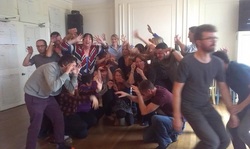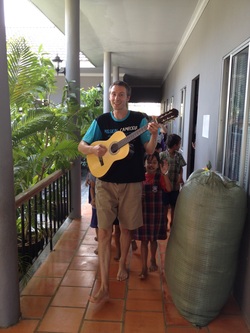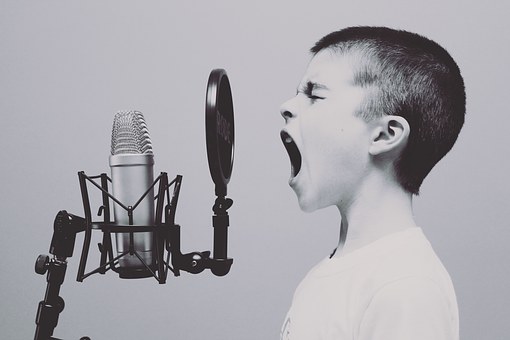 Wow, was it really nearly 6 months ago. That must mean it will all happen again in 6 months time! Oh how we laughed and cried and hugged and sang and laughed again. Fortunately for you I stuck the microphone on for some of the crazier bits and it does not get much more crazy then Heather and Joe's psychadelic singing experiments (or Singong for short). Listen as we garble on while the nice music plays in the background here in our new podcast
0 Comments
Decantophobia, Adophobia, Psallophobia or even karaokephobia! Whatever you want to call it, fear of singing in public regularly comes up as humankind's worst nightmare. Why on Earth should this be the case? Singing is one of our most fundamental and ancient activities, surely pre-dating our evolution to Homo Sapiens some 30,000 years ago. Our history used to be handed down orally through folk song and wandering troupes would spread local news and recount heroic fables through song. Were they as afraid of singing as we are now? Did villagers and tribes-people look on with admiration and awe as they were sung to thinking "I could NEVER do that"? Perhaps as we have developed more anonymous means of communication, news feeds, social media etc. we have forgotten our ancient connection to our own voices. It would certainly help to explain the enormous adrenaline surge and feeling of accomplishment that I have witnessed from singing workshop attendees who have entered the room with the fear in their eyes and then transformed it into zeal. Clearly those who attend choirs and regular singing groups have reconnected to their past? Well often not, single out a member of a choir at random and ask them to make up a couple of lines of a song from a subject and that fear returns with a vengeance.
Our eyes may be the window to our souls but the voice seems to contain a version of ourselves that is raw and vulnerable and that we want to protect from scrutiny. It is this vulnerability that provides such a rich and challenging environment for people when they are allowed to practise and perform singing in front of other people. The applause that comes from those watching is half appreciation and half respect, perhaps with a smattering of relief that it was not them up there. It is the ultimate risk-taking in action without the need for a physical safety net.  I have just returned from a volunteering trip to Soksan International school in Cambodia. My wife and I had the idea ever since having our first child to show them a bit of the world, and how other children did not enjoy the same privileges that they do. No idea if that worked or not, but I did get the chance to try out some musical and improv based exercises with some bemused looking Cambodian children and adults! The first thing I noticed was that the children were far less familiar with the whole idea of group games and exercises. Simple clapping exercises often turned out to be just too confusing, not because the children were unintelligent, just that they were not used to playing in such a controlled environment. Why clap when pointed to, when you could just clap all the time? Also there was a huge amount of shyness to being singled out of a class. So for example when doing some scales to different words, it was all but impossible to get a suggestion of a word from a single child. The best results came from inclusive activities that involved movement or group singing to a pre-existing song. As a result I wrote five songs that we could all learn together. This ended up with me leading the kids pied-piper style through the school (see pic). As for improv games with the teachers, we did get all the way through to 3-line scenes. It is so ingrained in their culture to be complimentary that most of the scenes went something like this: "You have a lovely face" "Thank you, you have lovely feet" "Thank you, your necklace is lovely" - and scene. However, we broke down a few barriers with the more physical games such as passing a sound, or zombie walk or Samurai. The adults were certainly willing to chuck themselves in and laugh and were not afraid to make themselves look silly. I would have liked more time with them as they certainly seemed to be getting the point of being relaxed and confident and making stuff up on the spot. It was a great experience seeing how improvisation can help with speaking a language that is unfamiliar, and also great to see the teachers letting their hair down and just having fun. Listening to some of their life stories was harrowing and it showed me that play and fun is not always frivolous - it can be a massive release and an opportunity to vent frustration in a safe en |
AuthorHeather Urquhart and Joe Samuel have over 15 years experience performing, teaching and writing about Musical Improv. Based in the UK they have facilitated workshops and graced stages around the world. Archives
November 2022
Categories
All
|

 RSS Feed
RSS Feed